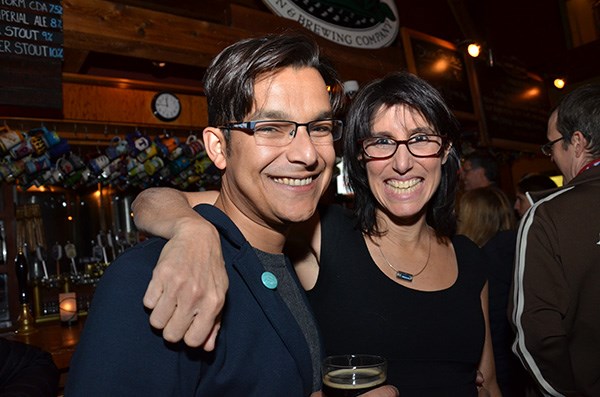Jason Blackman-Wulff knew he had a good chance of claiming a seat in Squamish’s city hall, but he wasn’t expecting to generate the second highest poll count for council.
“I was very, very excited,” he told The Squamish Chief. “I felt very validated.”
Blackman-Wulff was the dark horse of the Squamish election. The newcomer generated the second highest amount of votes for a seat at the council table, with 2,315 people choosing his name. He was merely 44 votes behind incumbent councillor Doug Race.
Blackman-Wulff works as a constituency assistant to Vancouver-Mount Pleasant MLA Jenny Kwan. Blackman-Wulff said having a background in politics gave him an advantage over other new candidates.
“I think for me, even when I started the campaign, I really want to put a lot of effort into this campaign,” the 33-year-old said. “I was a little more ready to go.”
Blackman-Wulff believes he was able to draw support from across the spectrum when it came to voters for and against the proposed Woodfibre liquefied natural gas (LNG) plant. Blackman-Wulff was one of five candidates endorsed by the Canadian Union of Public Employees (CUPE).
“They invited most of the candidates to speak to their members,” he said, noting the union was key in aiding him with his campaign.
Blackman-Wulff also reached out to the Squamish Nation community. He attended the Remembrance Day celebration at Totem Hall and got permission to canvas the Squamish Nation community.
Blackman-Wulff ran a solid online and social media campaign, as fellow council candidate Phil Audet noted. The Internet is leveling the playing field when it comes to newcomers pushing to enter municipal politics, Audet said.
Newcomer councillor-elect Karen Elliott said her goal was to run a values-based campaign. She took a strong stance against the proposed Woodfibre liquefied natural gas plant, but that wasn’t the only issue on the table, Elliott pointed out. During the election run-up, Elliott focused on food security, housing initiatives and youth needs within the community.
Like many Squamish residents, Elliott moved to town recently, in 2012. Elliott said she suspects many of her backers were among that growing group.
“They wanted to see their voice represented on council,” she said. “I certainly think that this council is a better makeup of who is living in Squamish now.”
There’s a good diversity represented at the table, Elliott said, noting that includes various stances on the Woodfibre liquefied natural gas plant proposal. She’s looking forward to a “rich conversation” regarding the proposal and better engaging the public on its future course.
“From the beginning I ran because I didn’t like the polarizing of the ‘yes or no’ debate.”
Council needs to provide the community with unbiased information from both sides of the debate. Squamish residents are passionate about their town and it’s time to work together to come up with a vision for the future, Elliott said, noting this will strengthen the district’s voice in Victoria.
“It is our town and we have to have a conversation with the province,” she said.
Peter Kent, who ran unsuccessfully in the 2011 election, also earned a council seat this time.




